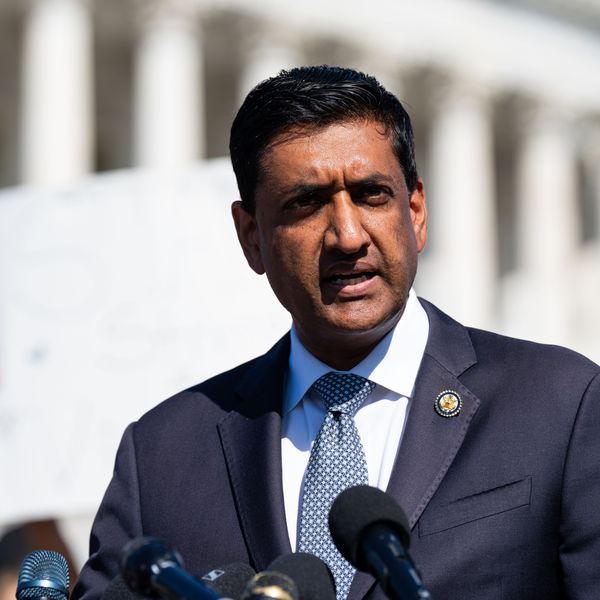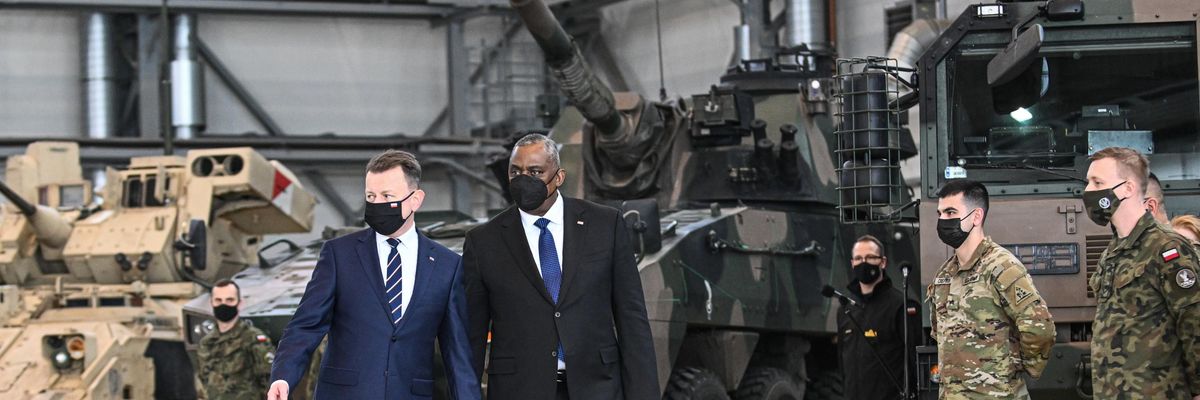As war hawks in the U.S. Congress attempt to use Russia's invasion of Ukraine as an opportunity to pour more money into the Pentagon's overflowing coffers, a new analysis released Thursday argues that such a move would be "counterproductive" and potentially detrimental to American security.
"The Pentagon budget authorized by Congress this year was, at $778 billion, one of the highest levels since World War II."
Authored by William Hartung, a senior research fellow at the Quincy Institute for Responsible Statecraft, the report argues that "current U.S. defense strategy costs too much and achieves too little," citing specifically the disastrous wars the U.S. launched in Iraq, Afghanistan, and elsewhere following the September 11 attacks.
On top of the incalculable human costs of the so-called "war on terror," the U.S. spent an estimated $8 trillion on post-9/11 conflicts.
"In the two largest wars, Iraq and Afghanistan, the United States has failed to meet its primary objectives of promoting stable, pro-U.S. governments and reducing the spread of global terrorism," Hartung notes. "The Taliban are now in power in Afghanistan. The U.S. intervention in Iraq helped bring a sectarian regime to power that created an environment in which the Islamic State, ISIS, could organize itself and seize large parts of northern Iraq--a development that took billions of dollars and thousands of troops to reverse."
Such failures, Hartung contends, demonstrate that more military spending is not the solution to present and future conflicts, including Russia's ongoing invasion and bombardment of Ukraine, carried out on the orders of Russian President Vladimir Putin.
"We don't need a bigger military budget to deter Putin," states a Quincy Institute press release summarizing the new report. "Contrary to rising calls to increase the United States' already massive military budget in response to Russia's invasion of Ukraine, boosting military spending would be misguided, counterproductive, and it would ultimately make America less safe."
Hartung's analysis was published as U.S. lawmakers from both major parties clamored for more military spending in response to Russia's deadly attack on Ukraine.
"Without question it's going to have to be bigger than we thought," Rep. Adam Smith (D-Wash.), the hawkish chair of the House Armed Services Committee, said Thursday, referring to the U.S. military budget. "The decision to invade Ukraine by Russia changes it and it's gonna go up. There's no doubt about it."
Sen. Rob Portman (R-Ohio) expressed a similar view in a speech on the Senate floor earlier this week, calling for more "shipments of lethal military arms to Ukraine, to the Baltics, to Poland and Romania, as well as increasing defense spending here at home."
Last month, before Russia launched its assault on Ukraine, U.S. President Joe Biden asked lawmakers to approve more than $770 billion for the military budget in Fiscal Year 2023, a request that progressive lawmakers and anti-war groups criticized as "absurd."
By comparison, Russia's annual military budget is roughly $62 billion. In 2020 alone, Hartung notes in his analysis, Lockheed Martin received $75 billion in Pentagon contracts.
Related Content
Biden's $770B Pentagon Budget Proposal Denounced as 'Absurd'
Julia Conley
A day after Russia began its full-scale invasion of Ukraine, the Biden White House told Congress that the U.S. Defense Department would need an additional $3.5 billion to respond to the attack.
But Hartung argued Wednesday that dumping more money into the U.S. Defense Department would perpetuate a destructive approach to foreign policy that has done much to fatten the pockets of weapons makers and little to advance the cause of peace.
"The Pentagon budget authorized by Congress this year was, at $778 billion, one of the highest levels since World War II and, as noted, $25 billion higher than what the Pentagon asked for," Hartung noted.
"In addition to being grounded in a misguided, military-first strategy," he continued, "these immense sums reflect the power of influence-peddling and pork-barrel politics--notably contributing to elections campaigns, distributing weapons facilities and bases in the states and districts of key members of Congress, hiring former government officials to lobby for arms companies, funding think tanks, and tapping corporate officials for government panels that define 'the threat.'"
Hartung called for a "new defense strategy grounded in a more realistic assessment of the challenges posed by Russia and China, a diplomacy-first approach to regional threats, a less-militarized approach to dealing with global terrorism, and a sharp reduction in the U.S. global military footprint."
"The Biden administration wants to have its cake and eat it too--trying to increase the military budget while also spending more on diplomacy and addressing the climate crisis," Hartung said in a statement. "This 'both and' strategy has failed--Pentagon spending increases have sailed through Congress while climate investments have stalled. It's time for our leaders to rightsize our bloated military budget, re-orient our defense strategy around urgent threats, and help deliver real security for the American people."



